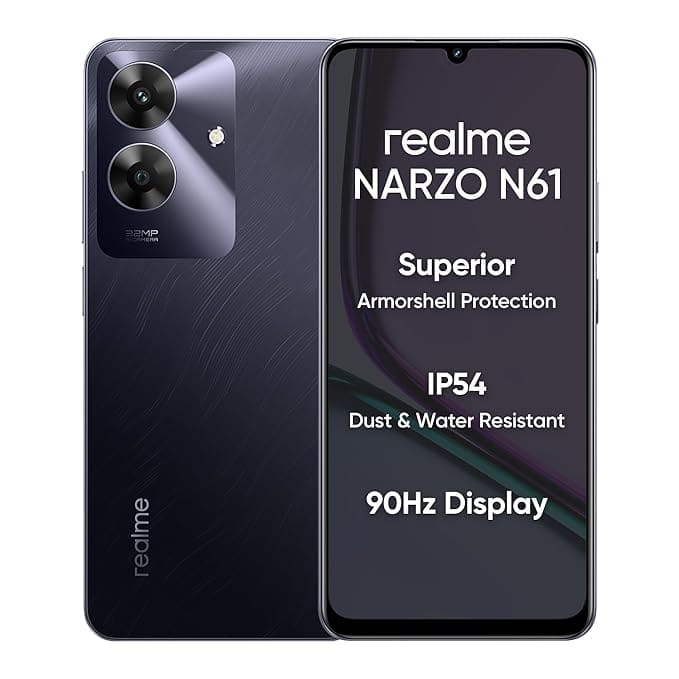English : Term 3 Unit 1 : Prose : Journey by Train
Warm Up
Work in pairs. Choose six items which are essential for a camp. Rank their priority and justify your answer.
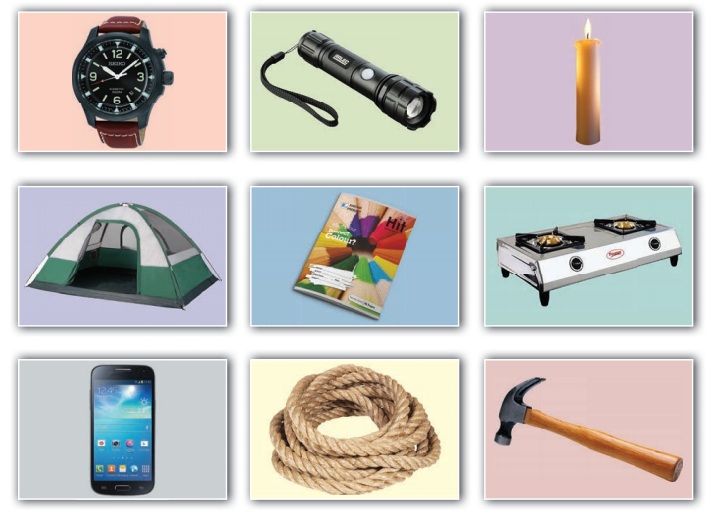
1. Torch Light
2. Tent
3. Cell Phone
4. Rope
5. Hammer
6. Stove
These things are essential for a camp because without these things, we cannot enjoy our camp. Camping is an amazing experience. So we should prepare ourselves properly with the essential items taken along with us. This will avoid frustration and stress.
Section I
Give a picturesque view through which the train travels.

GLOSSARY
Proceeded -moved
fertile territory– rich vegetated area
locomotive -railway engine
horizon -the line at which the earth’s surface and the sky appear to meet
gazing -look steadily
hasty-quick
Section II
Discuss and answer.
1. Why did the train stop in the middle of the forest?
Answer: The train stopped in the middle of the forest as there were no railroad lines beyond that place.
2. Why was Sir Francis angry?
Answer: There were no railroad lines from Kholby to Allahabad. But the tickets were sold from Bombay to Calcutta. So Sir Francis was angry.
GLOSSARY
halt – stop
acacia– a thorny tree
snapped – became angry
furious – extremely angry
foreseen – predicted
obstacle – difficulty
Section III
Discuss and answer.
1. Which mode of transport did Fogg choose?
Answer: At first, Fogg chose to go on foot to Allahabad. Then he purchased an elephant to take them to Allahabad.
2. Did he hire Kiouni? Why?
Answer: No, he did not hire Kiouni, but purchased it for 2000 pounds, because the owner of the elephant intended to make a big bargain and so refused to hire him.
3. Why was the elephant owner happy with the deal?
Answer: The elephant owner was happy with the deal because Mr. Fogg offered him 2000 pounds to purchase the elephant.
GLOSSARY
Hesitation -unwilling
Conveyance– transportation
rapidly– quickly
persisted– continued
refused– not willing
point- blank-bluntly
flurried– worried
yielded– accepted
howdahs– a seat for riding on the back of an elephant
carpet bag– Mr. Phileas Fogg left London with very little luggage. All his money was in the carpet bag.
perched– positioned
Questions Answers
READ AND UNDERSTAND
A. Fill in the table

B. Answer the questions briefly.
1. Who inhabited the jungles that the train passed through?
Answer: Snakes, tigers and elephants inhabited the jungles that the train passed through.
2. What was the reaction of the inhabitants?
Answer: Snakes and tigers fled at the noise of the train. The elephants stood gazing with sad eyes at the train, as it passed.
3. What did Mr. Fogg mean by, ‘it was foreseen’?
Answer: Mr. Fogg meant that some difficulty or the other would sooner or later arise on his route.
4. Describe the elephant driver in your own words.
Answer: The elephant driver was intelligent and a skilled young man. He covered the elephant’s back with saddle-cloth. He attached seats on each of its side. He sat on the neck of the elephant and set out from the village with the three passengers.
C. Think and Answer.
1. What qualities of Mr. Phileas Fogg are highlighted in this extract? Support your answer with suitable examples.
Answer: Mr. Phileas Fogg was a rich, English man. He was a member of the Reform Club of London. He orders his life precisely by the clock and makes a bet with fellow club members that he can travel around the world in 80 days. He travels with his French servant Passepartout. He is a precise and intelligent man. He is perfect in his manners and is very punctual as well as particular about what he wants. This is evident in this extract, when he is determined to travel to Allahabad as planned. He even goes to the extent of purchasing an elephant for 2000 pounds to continue his travel to Allahabad. These qualities of Mr. Fogg are highlighted in his extract.
Vocabulary
D. Fill in the blanks with correct travel words.
Schedule, reach, book, railway, pack, board
To make travel convenient, we must book tickets well in advance. Then we have to pack our things and schedule our trip. We have to reach the railway station in time and board the train in order to reach our destination.
E. Match the phrasal verbs with their meanings.
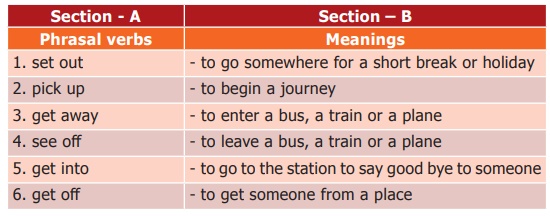
[Answer: I . (b) ; 2. (f); 3. (a); 4. (e); 5. (c); 6. (d)]
Phrasal verbs : Meaning
1. set out : to begin a journey
2. pick up : to get someone from a place
3. get away : to go somewhere for a short break or holiday
4. see off : to go to the station to say good bye to someone
5. get into : to enter a bus, a train or a plane
6. get off : to leave a bus, a train or a plane
F. DICTIONARY TASK
Refer to a dictionary. Find the meaning of the following words and write them down.
1. journey – The act of travelling from one place to another.
2. picnic – a trip or excursion to the country, seaside etc. on which people bring food to be eaten in the open air.
3. pilgrimage – a religious journey.
4. tour – a journey for pleasure in which several places are visited.
5. vacation – holiday.
6. excursion – a short journey or trip.
Language Check Point
Don’t say: Did you come in train?
Say: Did you come by train?
Note: Always use the preposition by to indicate travel by a vehicle.
Don’t say: I came to office by walk.
Say: I came to office on foot.
Note: We can say ‘by car”by bus’. But we cannot say ‘by walk’ as walk is not a means of transport used to travel. We walk on our feet.
Don’t say: The ship has a team of twenty five sailors.
Say: The ship has a crew of twenty five sailors.
Note: The group of people who work in a ship is called ‘crew’.
Listening and Speaking
LISTENING
G. Listen to the teacher reading the Weather forecast and complete the report.
Pre-boarding Announcement
(The deep depression over the Bay of Bengal became cyclone ‘Gaja’ on Sunday. North Tamil Nadu and Puducherry are likely to get good rains on November 14 and 15, Indian Meteorological Department offi cials said. The cyclone‘Gaja’ lay 840 km east of Chennai and 880 km east of Nagapatinam. It is likely to become a severe storm in the next 24 hours.)
Name of the Cyclone is Gaja. It may affect the places North Tamil Nadu and Puducherry. Heavy rains are expected on November 14th and 15th. It is 880 km away from Nagapatinam.
SPEAKING
H. Your family has decided to go on a tour during the vacation. You are calling a travel agency and seeking information regarding package, places of visit, cost etc. Work in pairs and role play as a receptionist and a customer.
Answer:
Receptionist : Good morning. This is Sai Dwaraka Mai Travel Agency. How can I help you?
Customer : We would like to go to a tour to Shirdi temple. Can you give us the information regarding the package, places of visit and the cost for it.
Receptionist : Yes, Madam. We offer flight packages from Chennai to Shirdi at affordable prices.
Customer : Okay Sir, what are the places of visit over there?
Receptionist : We take you to places like Dwarkamai, Chavadi, Gurusthan, Sai Museum, Maruthi temple and Nandadeep.
Customer : Okay fine. We would like to book tickets for the tour, as we would like to go any day between 23rd November and 27th November. What is the cost for four people?
Receptionist : It costs Rs. 9,999/- per person. So the total amount for four people would be Rs. 39,996/-.
Customer : Thank you Sir, I will get back to you immediately, after discussing with my family members.
Receptionist : Thank you for calling, Madam. Have a nice day.
Grammar
PICTO GRAMMAR
Reported Speech
The actual words spoken by a person is Direct speech. They are enclosed within quotation marks.
When we later report this, making changes to the words the speaker originally said, it is Reported Speech. (Indirect Speech)
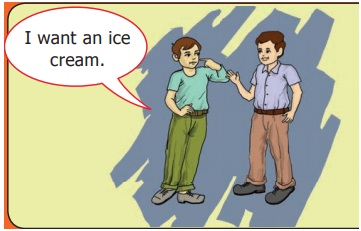
DIRECT SPEECH: Ram said to Rakesh, “I want an ice cream.’’
INDIRECT SPEECH: Ram told Rakesh that he wanted an ice cream.
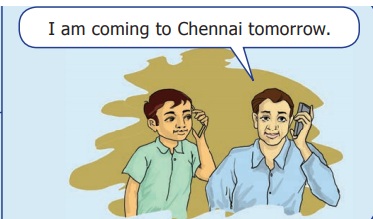
DIRECT SPEECH: My uncle said to me, “I am coming to Chennai tomorrow.”
INDIRECT SPEECH: My uncle told me that he was coming to Chennai the next day.
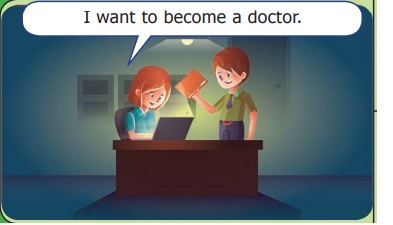
DIRECT SPEECH: Monica said,“I want to become a doctor.”
INDIRECT SPEECH: Monica said that she wanted to become a doctor.
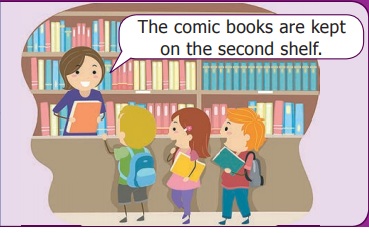
DIRECT SPEECH: The librarian said, “The comic books are kept on the second shelf.”
INDIRECT SPEECH: The librarian said that the comic books were kept on the second shelf.
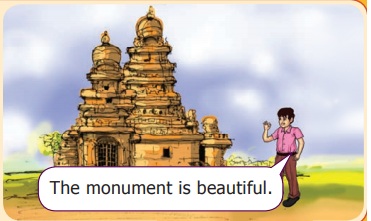
DIRECT SPEECH: Sidharthan said, “The monument is beautiful.”
INDIRECT SPEECH: Sidharthan said that the monument was beautiful.
USE GRAMMAR
I. Rewrite the story in the past tense.
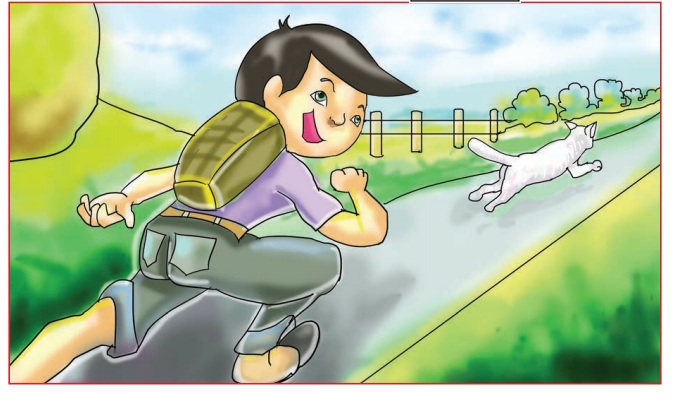
The boy chases a cat. The cat climbs up the tree and purrs from the branch of the tree. The cat jumps to another tree. The boy who is chasing the cat notices a snake under the tree. He leaves his attempt to catch the cat and he runs home screaming for help.
Answer:
The boy a cat. The cat climbed up the tree and purred from the branch of the tree. The cat jumped to another tree. The boy who was chasing the cat noticed a snake under the tree. He left his attempt to catch the cat and he ran home screaming for help.
J. Look at the picture and complete the following.
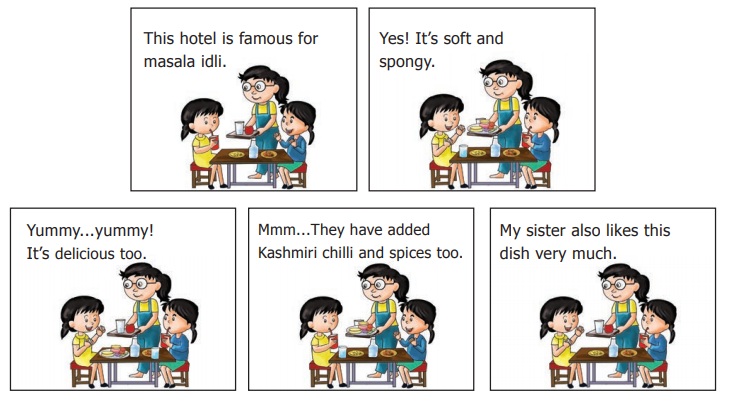
Nila told Miruthula that that hotel was famous for masala idli. Miruthula said that the idly was soft and spongy. Nila said that it was delicious too. She also said that they had added Kashmiri chilli. Miruthula said that her sister also liked that dish very much.
Writing and Creative Writing
WRITING
An itinerary
An itinerary is a detailed plan of a journey. It includes dates, time, stops, activity and mode of transport.
K. Your friend is coming to your city / town to spend a week with you. He / she wants to visit some tourist places, and enjoy the special food items of the place. Prepare a two day itinerary for the visit.
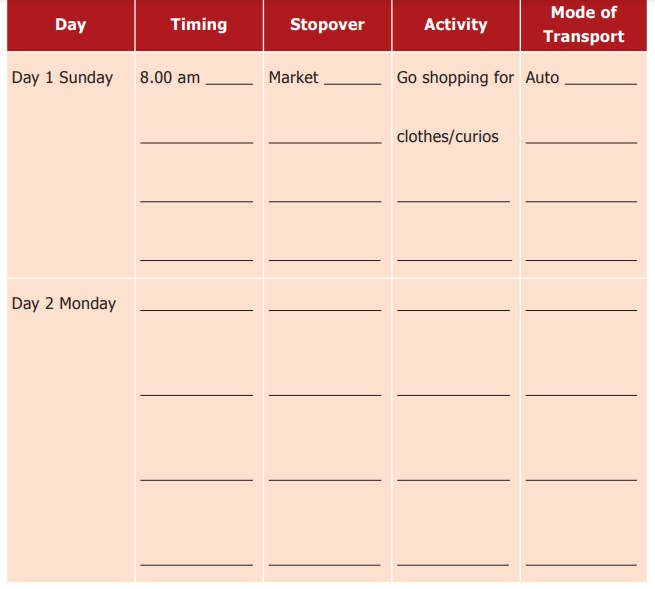
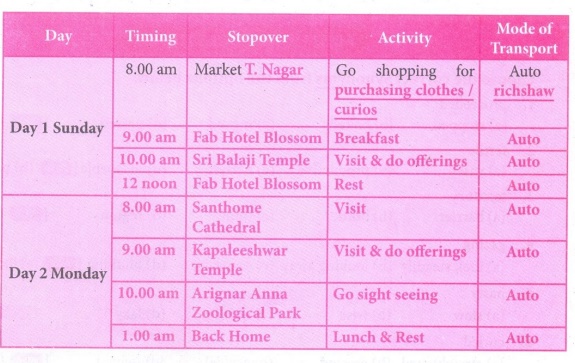
CREATIVE WRITING
L. You are waiting to board a train in a railway station. The train is delayed by an hour. Write a paragraph about the crowded scene in the railway station based on your observation.

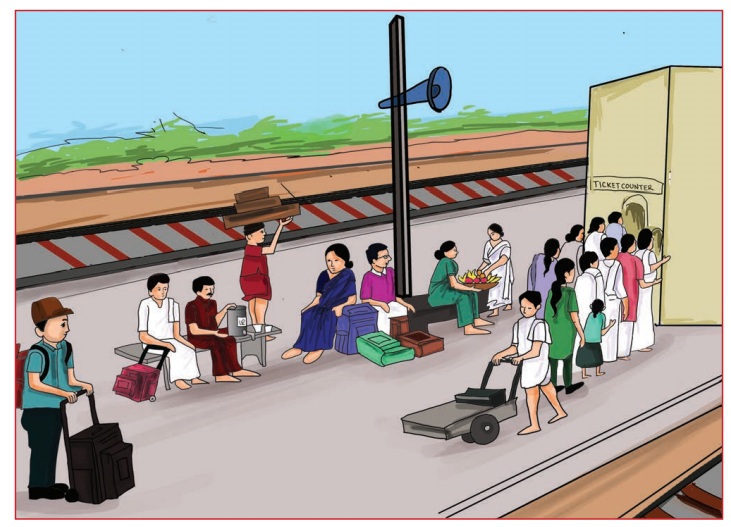
Answer:
I was waiting to board a train at a railway station. The train was delayed by an hour. A lot of families were waiting eagerly for the announcement of the arrival of the train. Some of the porters were carrying the luggage of the passengers. Piles of luggage were seen all over. There were fruit vendors, tea vendors and other shops selling water, milk and snacks. By the ticket counter, there was a queue, waiting to buy tickets. The scroll board was displaying the necessary information for the passengers. The porters were also using trolleys to carry the luggage.














